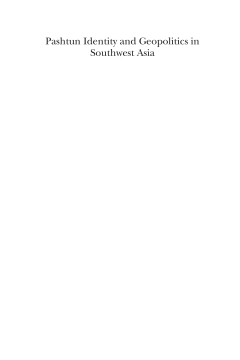
Additional Information
Book Details
Abstract
‘Pashtun Identity and Geopolitics in Southwest Asia’ brings together Pakistan and Afghanistan as two inseparable entities by investigating areas such as the evolution and persistence of the Taliban, quest for Pashtun identity, the ambivalent status of the tribal region and the state of civic clusters on both sides. In addition to their relations with the United States and the EU, a due attention has been devoted to regional realties while looking at relations with India and China. The study explores vital disciplines of ethnography, history, Islamic studies, and international relations and benefits from a wide variety of source material. The volume takes into account the salient subjects including political Islam, nature and extent of violence since 9/11, failure of Western policies in the region, the Drone warfare, and the emergence of new regimes in Kabul, Islamabad and Delhi offering fresh opportunities as well as new threat perceptions.
‘Pashtun Identity and Geopolitics in Southwest Asia’ brings together Pakistan and Afghanistan as two inseparable entities by investigating areas such as the evolution and persistence of the Taliban, quest for Pashtun identity, the ambivalent status of the tribal region and the state of civic clusters on both sides. In addition to their relations with the United States and the EU, a due attention has been devoted to regional realties while looking at relations with India and China. The study explores vital disciplines of ethnography, history, Islamic studies, and international relations and benefits from a wide variety of source material. The volume takes into account the salient subjects including political Islam, nature and extent of violence since 9/11, failure of Western policies in the region, the Drone warfare, and the emergence of new regimes in Kabul, Islamabad and Delhi offering fresh opportunities as well as new threat perceptions.
Iftikhar H. Malik is Professor of History at Bath Spa University and a historian of South Asia, Political Islam, and Muslim Diaspora communities.
"Tied together by policy making circles for strategic purposes and referred to in modern day geo-political parlance as Af-Pak, the region widely known as South West Asia has a rich cultural past and civilizational commonalities which have been aptly brought out in this important new contribution by one of Pakistan's most accomplished and prolific scholars." —Ali Usman Qasmi, Lahore University of Management Sciences
Table of Contents
| Section Title | Page | Action | Price |
|---|---|---|---|
| Front Matter | i | ||
| Half Title | i | ||
| Series | ii | ||
| Title | iii | ||
| Copyright | iv | ||
| Contents | v | ||
| Preface | vii | ||
| Acronyms | xi | ||
| Glossary | xiii | ||
| Maps | xv | ||
| Chapters | 1 | ||
| Introduction | 1 | ||
| Chapter One: Gandhara Lands: Wrestling with Pashtun Identity and History | 13 | ||
| Chapter Two: Imperial Hubris: The Afghan Taliban in Ascendance | 33 | ||
| Chapter Three: Masculinities in Conflict: Western Pedagogy and the Return of the Afghan Taliban | 53 | ||
| Chapter Four: Understanding Pakistan: Geopolitical Legacies and Perspectives on Violence | 67 | ||
| Chapter Five: Locating Civic Sentiments and Movements in Pakistan: Stalemated Cycle, or a Way Forward? | 83 | ||
| Chapter Six: The United States and Pakistan: Friends or Foes! | 103 | ||
| Chapter Seven: The European Union and Southwest Asia: Perceptions, Policies and Permutations | 115 | ||
| Conclusion: Pashtun Troubled Lands, Uncertain Southwest Asia, or a New Beginning | 133 | ||
| Back Matter | 151 | ||
| Notes | 151 | ||
| Bibliography | 195 | ||
| Index | 205 |
